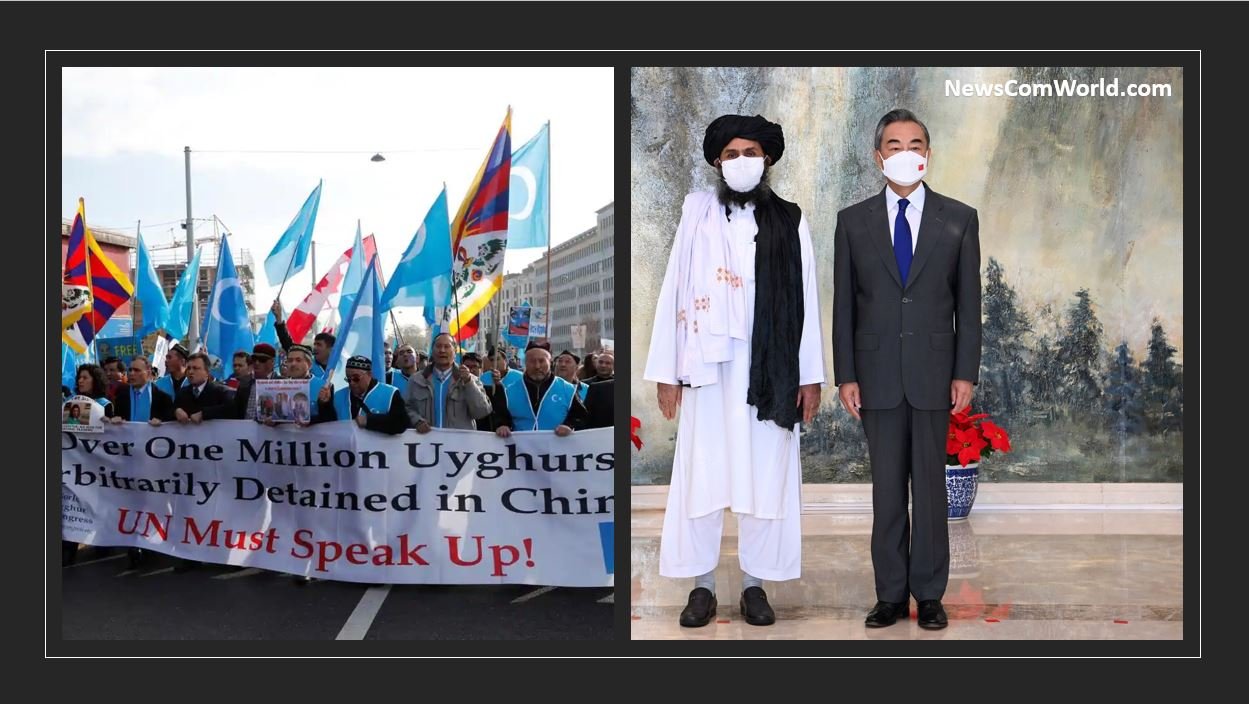China is now a sinking ship with more and more Chinese state linked companies are defaulting and that has triggered bond selloff in the market. The face of an economic superpower that China projects in the world is not all that glittering. Beneath all that glitter is the dark hollowness China created with currency and share price manipulations.

A week back Chinese technology giants from Alibaba Group Holding Ltd. to Tencent Holdings Ltd shed almost $260 billion of market value over two days of frantic selling, as investors scrambled to assess the fallout from Beijing’s broadest attempt to rein in its most powerful private-sector firms.
Technology shares tumbled for a second day after Beijing issued regulations designed to curb the growing influence of internet-sector leaders including JD.com Inc., Meituan and Xiaomi Corp. The Hang Seng Tech Index slumped 5.6% on Wednesday in Hong Kong, taking its two-day loss to 10% as of midday. Shares in the quintet of firms have sunk at least 8% over two sessions.
Related Article Alibaba Leads Chinese Internet Selloff Approaching $260 Billion
China’s first public bond default happened just six years ago.
“Onshore investors used to pay less attention to the covenants and provisions,” said Ivan Chung, head of Greater China Credit Research & Analysis at Moody’s. “Credit incidents and defaults in the past two years have alerted investors about these weaknesses. Yet there are still lots of outstanding bonds in the market with weak protection for investors.”
Risks for bondholders are rising even faster now as Chinese officials seek to avert an avalanche of defaults caused by the country’s coronavirus-ravaged economy. They are encouraging struggling companies to extend repayment dates or exchange debt coming due for new bonds – both of which need bondholder agreement.
Related Article : Rampant Corporate Frauds by US Listed Chinese Companies Exposed
Now as per bloomberg.com a top Chinese chipmaker and a major car manufacturer announced debt defaults on Monday, expanding a list of distressed state-linked firms that have roiled the country’s credit market in recent days.
Related Article Chinese Industrial Espionage Cases In The USA: The Modus Operandi
Tsinghua Unigroup Co. said it wasn’t able to to repay a 5.6%, 1.3 billion yuan ($197 million) privately issued onshore bond due Monday, citing tight liquidity and after failing to win immediate approval from creditors to delay full repayment on the note. Brilliance Auto Group Holdings Co., a Chinese automaker linked to BMW AG, also announced that it has defaulted on 6.5 billion yuan ($987 million) of debt.
Uncertainty has been growing over Beijing’s willingness to support state-linked firms struggling to manage their debt loads in recent weeks. The unexpected default of a Chinese coal miner has prompted particular concern over the health of these firms and their lenders, triggering a selloff in bonds issued by weaker borrowers from the sector and prompting some of them to cancel debt sales.
Amid the deepening stress, officials from China’s State Council have asked government departments to conduct a risk assessment, according to people familiar with the matter. The aim is to ensure stability in financial markets and to prevent any spillover effects from the credit sphere that could cause systemic risks, said the people, who aren’t authorized to speak publicly and declined to be named.
Government Checks
If there is a risk of contagion, the regulator will have a response plan, although the people said that the initiative doesn’t mean that there will be bailouts. Regulatory authorities have made inquiries with senior executives of companies including Tsinghua Unigroup about their recent situations, one of the people said.
The number of defaults by China’s state-run firms is expected to rise marginally next year as the central bank has shifted toward a more neutral policy stance amid an economic recovery, according to a Fitch report.
Backed by the prestigious Tsinghua University, Unigroup said it will keep raising funds to repay its bond’s principal and interest, according to a company statement seen by Bloomberg News. A Unigroup official in charge of matters related to the bond couldn’t immediately comment on the issue.
The chipmaker’s notes have tumbled since late October, when its decision not to buy back a privately issued 6.5%, 1 billion yuan perpetual bond triggered concerns about its repayment abilities. Worries about Unigroup’s finances and fate have persisted since two years ago, when Beijing ordered education providers to distance themselves from commercial operations.
Related Article PRC State-Owned Company And Others Charged With Economic Espionage in US
Disrupting Production
Also on Monday, Brilliance Auto revealed its own debt failure on 6.5 billion yuan via a statement posted on Chinabond.com, adding that it had 144 million yuan of interest overdue. It attributed its defaults to tight liquidity and a failure to obtain approval for credit-line rollovers. The defaults have affected production and operations and worsened its financial situation “significantly,” the automaker said.
According to the statement, Brilliance Auto’s soured debts included bank loans, bonds, financial leasing contracts and trust loans. The revelations of the automaker’s debt blowup came after a creditor filed an application to initiate a local court-led restructuring against the Liaoning-based parent of BMW’s joint venture partner in China.
Brilliance Auto’s bonds have slumped after it failed to repay its 5.3%, three-year 1 billion yuan bond due Oct. 23, intensifying longstanding concern about its finances since its Hong Kong-listed unit agreed two years ago to give up control over its joint venture with BMW by 2022. The China-based joint venture has been a crucial source of earnings for the group.
China’s first public bond default happened just six years ago.
“Onshore investors used to pay less attention to the covenants and provisions,” said Ivan Chung, head of Greater China Credit Research & Analysis at Moody’s. “Credit incidents and defaults in the past two years have alerted investors about these weaknesses. Yet there are still lots of outstanding bonds in the market with weak protection for investors.”
Risks for bondholders are rising even faster now as Chinese officials seek to avert an avalanche of defaults caused by the country’s coronavirus-ravaged economy. They are encouraging struggling companies to extend repayment dates or exchange debt coming due for new bonds – both of which need bondholder agreement.
Goldman Sachs analysts count at least 10 Chinese borrowers that have avoided defaults this year by extending principal repayments worth a combined 6 billion yuan ($846.80 million).
Inadequate investor protection threatens to “push up companies’ financing costs … and reduce foreigners’ willingness to participate in China’s bond market.
One of the earlier causes of investor outrage this year was conglomerate HNA [HNAIRC.UL], which gave holders of one $55 million bond just 30 minutes’ official notice of a meeting that would extend by a year its imminent repayment, even though its own rules required 30 days’ notice and exchange rules require 10 days.
HNA subsequently apologised and explained it had discussed the deferral with major bondholders ahead of the meeting. Three big investors accounting for more than 98% of the bonds represented at the meeting voted for the plan, while 29 voted against.
Bondholders in other companies have complained about the way they have been treated. One angry investor found his line cut off mid-question during a call in February to discuss an offer to pay about 40 cents on the dollar for $850 million in Qinghai Provincial Investment Group (QPIG) bonds.
“If authorities give the nod to such a practice, it shows deficiency in our legal protection for bondholders,” Chen said of the move.
In June 2020, Hilong Holding Ltd., a provider of oil-field services and equipment, said it wouldn’t be able to repay holders of a maturing dollar bond—the latest offshore default by a Chinese borrower.
In June 2020, another Chinese property developer Gemdale Corp 600383.SS offered holders of its 1 billion yuan 5.29% May 2021 bond CN143657SH= a 1.5% rate for the final coupon payment, despite a prospectus clause that said any coupon adjustments must be increases.
The move angered bondholders and prompted sarcastic suggestions on social media that Gemdale had increased the coupon by a negative number. The Shanghai Stock Exchange demanded an explanation.
the government-induced calm in local credit markets is unlikely to last. Analysts say non-state companies, lower-rated developers and some local government financing vehicles are particularly vulnerable as borrowing costs climb and refinancing becomes more difficult.
“The government has neither the firepower nor the will to backstop it all,” said Brock Silvers, chief investment officer at Adamas Asset Management in Hong Kong, adding that he expects onshore defaults in China to reach a new annual record. That would mean another 72.2 billion yuan of delinquencies by the end of December 2020.
Points to Ponder
Investors within China do not have any legal protection. Do you think outside investors in Chinese companies will have any kind of protection?
Shouldn’t all the US, European and South Asian funds pull out their investments out of China and cut off their losses?
Chinese economy is an export oriented economy. Do you think anyone in the world would like to buy the Chinese products after Bio-terrorist China killed over 1.33 million people worldwide with its Bio-weapon Chinese Corona Virus?
With the small retail investors losing their investments, declining exports, retaliation by other countries because of CCP China trying to take over entire South China Sea, how long it is before Chinese economy collapses and people join the democracy movement?
Follow us at:-
Twitter Handle: @newscomworld
Instagram Handle: @newscomworld
Parler Handle: @newscommuniquecom
Subscribe our : YouTube Channel https://www.youtube.com/channel/UCnKJQ3gFsRVWpvdjnntQoAA
Like our Facebook Page https://www.facebook.com/NewsComWorld
2,586 total views








